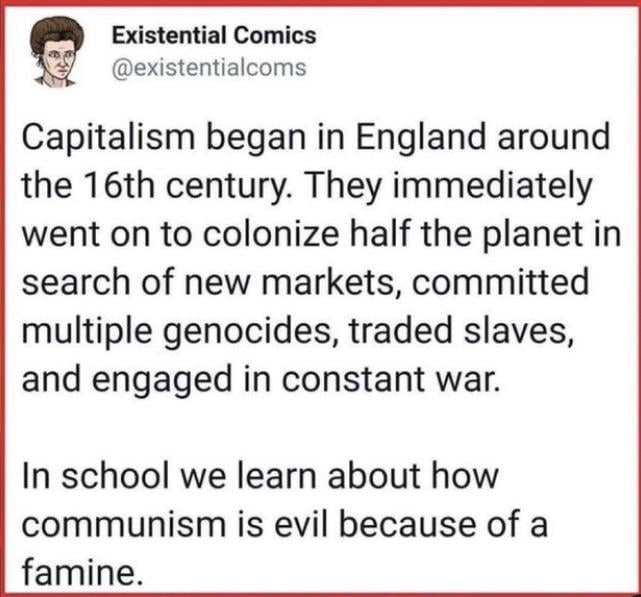Late Stage Capitalism
A place for for news, discussion, memes, and links criticizing capitalism and advancing viewpoints that challenge liberal capitalist ideology. That means any support for any liberal capitalist political party (like the Democrats) is strictly prohibited.
A zero-tolerance policy for bigotry of any kind. Failure to respect this will result in a ban.
RULES:
1 Understand the left starts at anti-capitalism.
2 No Trolling
3 No capitalist apologia, anti-socialism, or liberalism, liberalism is in direct conflict with the left. Support for capitalism or for the parties or ideologies that uphold it are not welcome or tolerated.
4 No imperialism, conservatism, reactionism or Zionism, lessor evil rhetoric. Dismissing 3rd party votes or 'wasted votes on 3rd party' is lessor evil rhetoric.
5 No bigotry, no racism, sexism, antisemitism, homophobia, transphobia, ableism, or any type of prejudice.
6 Be civil in comments and no accusations of being a bot, 'paid by Putin,' Tankie, etc.
view the rest of the comments

Less than you might think! The Imperial state apparatus was actually very skeletal compared to what we think of it, at least during the height of the Empire. We're talking entire provinces with only a few dozen actual imperial officials to manage it, most of whom brought their own private staffs. Senators were formally barred from large-scale commerce, but they got around this by investing their money with non-office-holding individuals to engage in business on an obscene scale. Most of the resources moving around were moved by private trade, and at immense profit. Only a few resources were subject to imperial monopolies or had widespread imperial control; everyone else was playing a more-or-less recognizable hustle of commerce - buy or lease cheap, produce at low cost, sell at high profit.
Not even close, I'm afraid! Even in the city of Rome itself, and it was only in the city itself where the grain dole was in effect, it was limited to a certain number of citizens, and most of it was sold subsidized by the state rather than free. Those citizens who received the grain dole, furthermore, were not selected out of the poorest of the poor - it was largely the established working families - semiskilled workers, artisans. small merchants and the like, who might be expected to have times of hardship but not be in constant danger of starvation - it was a political subsidy to these people, who still had some social pull and connections in the city but were not integrated enough into the power structures to have a firm interest in sustaining it, to keep them from calling for anything dangerous, like more democracy!
The ultra-impoverished largely were left to the issue of charity and political patronage (which was big in Rome), and starved about as much as any impoverished pre-modern group. Maybe a little less, considering votes were almost literally bought long after voting ceased to be meaningful. One supposes that's a bit more money than most would have.